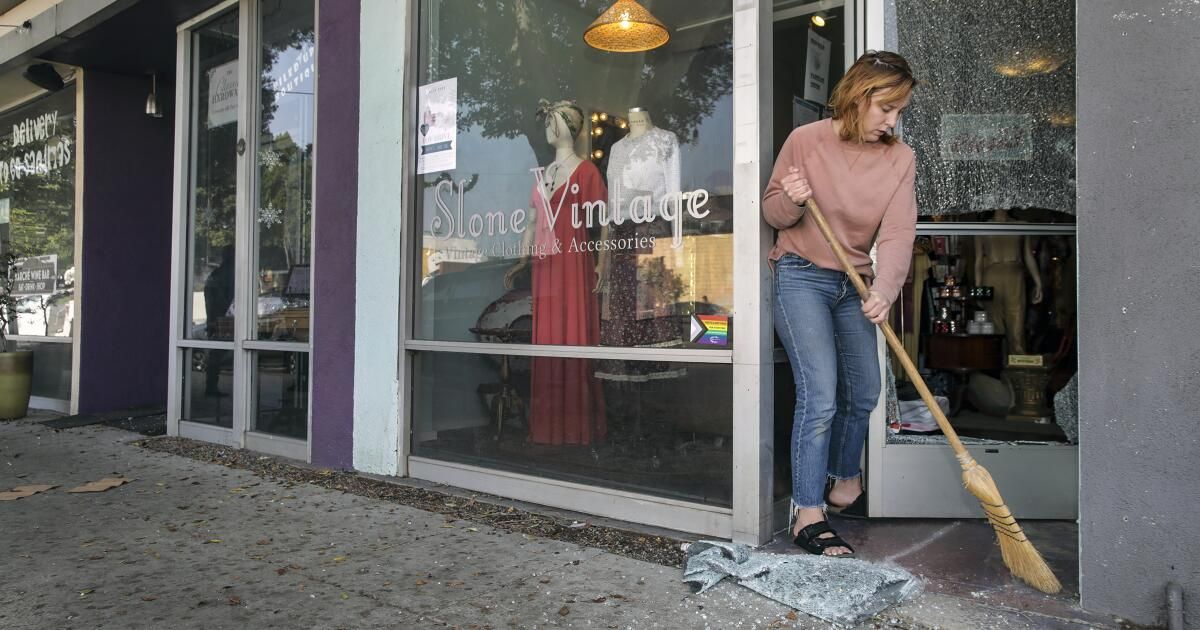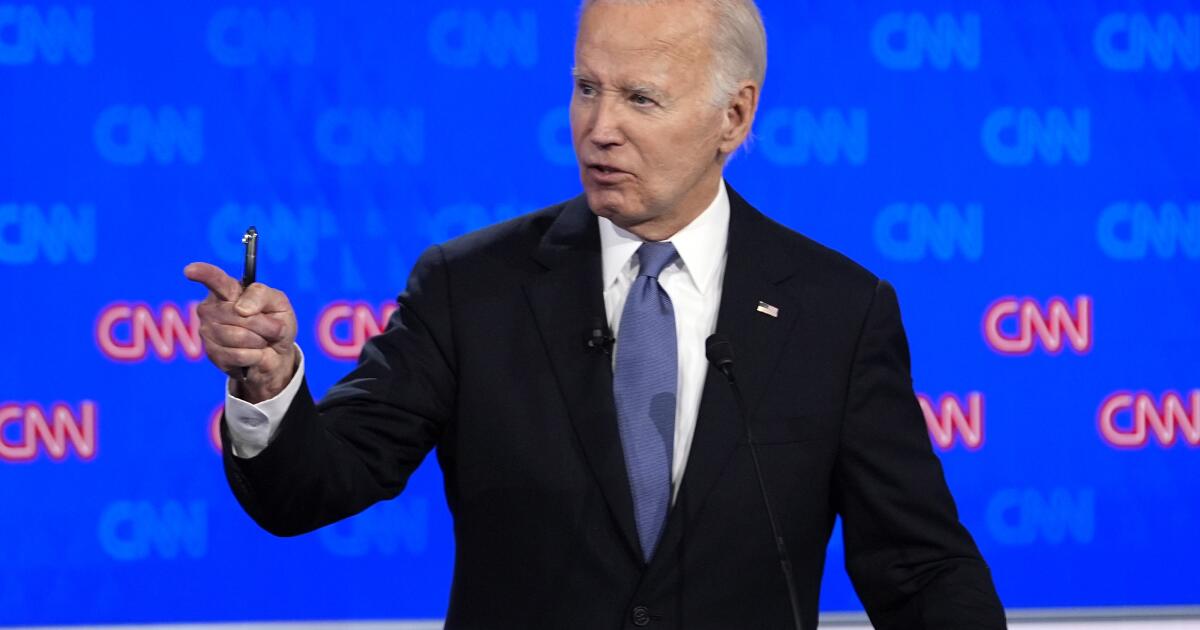Gov. Gavin Newsom and Democratic legislative leaders are vehemently opposed to an anti-retail theft measure on the November ballot, but California voters are ignoring them and overwhelmingly supporting the proposal.
Maybe voters don't know that the governor and lawmakers strongly oppose the measure. Or maybe they do know and don't care. They're following their own instincts and thinking that California is, once again, being too lenient on the bad guys.
The pendulum seems to be swinging from left to center when it comes to crime and incarceration. Three decades ago, California was on the right with the war on drugs and harsh three-strike sentences for repeat offenders. Then, gradually, we moved left by drastically reducing punishments. Opinions continue to swing.
Support for Proposition 36, sponsored by the California District Attorneys Association, is staggering. It would increase punishment for theft and hard drug offenses and impose mandatory treatment for repeat addicts.
The initiative holds a surprising 45 percentage point lead, according to a new poll of likely voters by the nonpartisan Public Policy Institute of California: 71 percent to 26 percent, with just 3 percent undecided.
This is unprecedented for a controversial ballot measure.
Well, at least it is a controversial topic among politicians, but apparently not among voters.
“I was surprised by the level of support,” says Mark Baldassare, a pollster at the Public Policy Institute of California.
But he adds this caveat: “Proposals aren’t like candidate elections. They can fall apart. And the campaign for and against Proposition 36 hasn’t even started yet. It’s easy for people to say ‘no’ to a proposal instead of ‘yes.’ Especially if someone comes along and points out a fatal flaw.”
Sure, but don't bet on it. Opponents have a very steep road ahead of them to defeat Prop 36.
Across all demographic groups, including Democrats, the initiative leads by an overwhelming margin: 63% to 33%. Self-described liberals support it 56% to 41%.
Baldassare notes that of the 10 statewide ballot measures, voters view Proposition 36 as the most important by far, according to his survey.
Another independent poll last month by the Institute of Governmental Studies at the University of California, Berkeley, also showed the measure leading by a wide margin: 56% to 23%, with 21% undecided.
IGS pollster Mark DiCamillo cited the “high visibility” of retail theft (caught on camera or witnessed in person by voters) as a reason for the strong support for Prop 36.
“It’s a little bit outrageous for voters what they’re seeing,” DiCamillo told Times reporter Mackenzie Mays. “And they’re tying it to the passage of Prop. 47.”
Ten years ago, that proposal sent California swinging to the left on crime punishment. Pressure had mounted from federal courts to reduce prison and jail overcrowding. The measure passed unevenly, reducing some serious crimes to misdemeanors with low penalties, including shoplifting when the stolen goods were worth less than $950.
Arrests for minor crimes are harder to make because an officer must witness a crime or have a warrant. Judges began to let petty thieves off the hook anyway. So cops stopped responding to shoplifting complaints. Shopkeepers stopped bothering to report crimes, and robberies with violence increased.
PPIC researchers recently reported on a year-long study of the impact of Proposition 47.
“Under Prop. 47, prison and jail populations plummeted, as did arrests for drug and property offenses after certain crimes were reclassified from felonies to misdemeanors,” the report states.
But the pandemic also contributed to fewer arrests. As people stayed home to prevent the spread of COVID, there were “fewer encounters with police, resulting in fewer arrests,” the researchers said.
In any case, public pressure mounted on Sacramento Democrats to do something, and they didn't do it for several years. They probably thought the growing rejection of Proposition 47 would simply fade away. It didn't.
Newsom was one of the most vocal original proponents of Prop 47 and has been a staunch supporter.
“We don’t have to go back to the failed policies of the last century,” he insisted. “Mass incarceration has been shown to be ineffective and is not the solution.”
Newsom's initial response included trying to force Proposition 36 off the ballot, but it clumsily failed and left legislative leaders distraught with the governor.
Proposition 36 would override parts of Proposition 47. The governor backed a legislative package aimed at reducing retail theft without significantly altering Proposition 47, but he concocted a crazy “poison pill” that would have automatically killed Democrats’ own anti-crime legislation if Proposition 36 had been approved by voters.
The goal was to force the sponsors of Prop 36 to throw in the towel and accept the Legislature's proposal. But Democrats rebelled against the governor's bizarre plan and refused to include the deadly pill in their package.
The Legislature ultimately approved 13 bills that Newsom and Democratic lawmakers hope will satisfy voters' demands that California do more to combat theft and shoplifting.
“The bills they passed do some good things, but overall they are half measures,” said Gregory Totten, executive director of the California District Attorneys Association. “Our law [36] “He says the consequences for theft should be more severe.”
The initiative would also impose tougher penalties for selling the deadly fentanyl and treat it similarly to other hard drugs, such as heroin and cocaine. Some people who possess hard drugs could simply be sentenced to treatment.
Outside of Sacramento, some prominent Democrats have listened to voters, read the polls and are supporting Prop 36. They include Mayors London Breed of San Francisco, Todd Gloria of San Diego and Matt Mahan of San Jose.
But Sacramento Mayor Darrell Steinberg, a former state Senate leader who has spent his career trying to create treatment for homeless drug addicts and the mentally ill, opposes Prop 36.
Steinberg argues that Bill 36 offers a “false promise” of treatment, which will not be enough because the emphasis will be on law enforcement, not on treating addicts.
But so far, Newsom and Sacramento Democrats have failed to sway anyone away from Prop 36. Voters are headed in the opposite direction.












